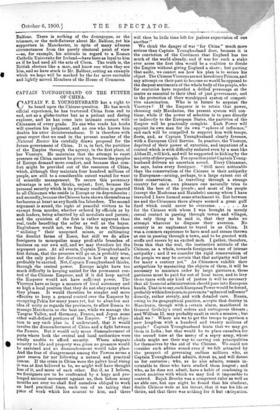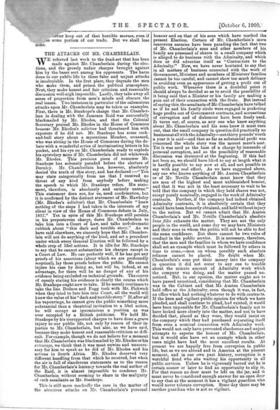CAPTAIN YOUNGHUSBAND ON THE FUTURE OF CHINA.
CAPTAIN F. E. YOUNGHUSBAND has a right to be heard upon the Chinese question. He has much official experience, he has traversed China from end to end, not as a globe-trotter but as a patient and daring explorer, and he has come into intimate contact with Chinamen of every grade. No one who reads his books will question his judgment, and no one who knows him doubts his utter disinterestedness. It is therefore with great regret that we read in the present number of the National Review his carefully drawn proposal for the future government of China. It is, in fact, the partition of the Empire through the agency, in the first place, of her Viceroys. He maintains that the attempt to exert pressure on China cannot be given up, because the peoples of Europe demand more comfort, and because that com- fort might be provided out of the resources of China, which, although they maintain four hundred millions of people, are still to a considerable extent wasted for want of scientific management. To secure this pecuniary advantage is not, he thinks, unjust; first, because the personal security which is its primary condition is granted to all Chinamen who reside in Europe or its dependencies ; and secondly, because the Chinese have shown themselves as barbarous at heart as any South Sea Islanders. The second argument is sound, the right of peaceful visitors to be exempt from murder, whether ordered by officials or by mob leaders, being admitted by all moralists and jurists; and the cynicism of the first is rather apparent than real, trade benefiting the seller as well as the buyer. Englishmen would not, we fear, like to see Chinamen "utilising " their unopened mines, or cultivating the derelict farms of Essex, but still we do allow foreigners to monopolise many profitable branches of business on our own soil, and we may therefore let tbe argument pass. At all events, Captain Younghusband's first datum, that the pressure will go on, is probably true, and the only point for discussion is how it may most profitably be exerted. Not, Captain Younghusband thinks, through the central power. Europe might have too much difficulty in keeping united for the permanent con- trol of the Chinese Emperor, and if it did keep united the Emperor would not have sufficient power. The Viceroys have so large a measure of local autonomy and so high a local position that they do not obey except when they please. It would therefore be simpler and more effective to keep a general control over the Emperor by occupying Pekin for many years yet, but to abandon any idea of unity as regards the provinces, to allow Russia to manage Manchuria as she beat can, while we manage the Yangtse Valley, and Germany, France, and Japs,n some other well-defined portions of the Empire. "The objec- tion to any such plan is, I understand, that it would involve the dismemberment of China and a fight between the Powers. But it would only mean dismemberment of parts where both the central and local authorities were wholly unable to afford security. Where adequate security to life and, property was given no pressure would be exercised and no dismemberment would take place. And the fear of disagreement among the Powers seems a poor reason for not following a natural and practical course. If the crisis in China were the paltry local rising it was at first believed to be, we might well have thought less of it, and more of each other. But if, as I believe, we foreigners are to be confronted by a huge and pro- longed national movement against us, then before many months are over.we shall find ourselves obliged to work on hard practical' lines, each one of us taking that piece of work which lies nearest to him, and there will then be little time left for jealous supervision of one another."
We think the danger of war "for China" much more serious than Captain Younghusband does, because it is the conviction of the Continent that England has too much of the world already, and if war for such a stake ever arose the first idea would be a coalition to divide the Empire without giving England a share ; but putting that aside, we cannot see how his plan is to secure his object. The Chinese Viceroys are not hereditary Princes, and any attempt on their part to become so would be opposed to the deepest sentiments of the whole body of the-people, who for centuries have regarded a deified personage at the centre as essential to their ideal of just government, and to the protection of their worshipped system of competi- tive examination. Who is in future to appoint the Viceroys ? If the Emperor is to retain that power, choosing only Mandarins, the present system will con- tinue, while if the power of selection is to pass directly or indirectly to the European States, the partition of the Empire will be practically complete. Each Power will appoint its own man for its own "sphere of influence," and each will be compelled to support him with troops, fleets, and, as Captain Younghusband clearly foresees, with a European Civil Service. In practice, the Viceroy% deprived of their power of extortion, and impatient of a. control which is with difficulty endured even by a man like Abbas II., will kick, and will be supported in kicking by the majority of their people. For upon this point Captain Young. husband delivers no uncertain sound. Every Chinaman, he says, hates every foreigner. "Still more noticeable than the conservatism of the Chinese is their antipathy to Europeans—arising, perhaps, to a large extent out of their -conservatism. In travelling through a strange country for one's own pleasure one naturally tries to think the beat of the people ; and most of the people (except the Mashonas and Matabele) among whom I have travelled I have formed some attachment to. But between me and the Chinamen there always seemed a great gulf fixed which could never be overcome As for the Chinese with whom I was brought in merely casual contact in passing through towns and villages, the only thing to be said is, that they make no attempt whatever to disguise their aversion. No country is so unpleasant to travel in as China. It was a common experience to have mud and stones thrown at one in passing through a town, and to be greeted with scoffs and sneers by an excited mob. I gather, therefore, from this that the real, the instinctive attitude of the Chinese. as a whole, towards foreigners is one of intense antipathy ; and if we consider the rigid conservatism of the people we may be certain that that antipathy will last for many a century yet." As Chinamen exhibit theii antipathies by massacring the objects of them, it will be necessary to maintain order. by large garrison s, those garrisons must be paid for out of local taxes, and to levy those taxes with any kind of justice it will be necessary that all financial administration should pass into European hands. That is to say, each Eu ropean Power would be forced, probably within five years, to govern its "sphere of influence" directly, rather sternly, arid with detailed care. Russia, owing to its geographical position, accepts that destiny in Manchuria, though with a. certain alarm, manifested in General Gribsky's cruel orders and outrageous threats ; and William II. may probably exult in such a mission ; but shall we ? Where are we to get the troops to garrison'a new kingdom with a hundred and twenty millions of people ? Captain Younghusband hints that we may get them in India ; but that would be to place ourselves for the second time at the mercy of a sepoy .army, whose chiefs might see their way to -carving out principalities for themselves by the aid of the Chinese. We could not consider such advice sound even if we felt attracted by the prospect of governing endless millions who, as Captain Younghusband admits, detest us, and will detest us for. centuries ; who, as he also admits, remain in- scrutable to those who have studied them longest ; and who, as he does not admit,. have a habit of combining in secret societies with which we may find it impossible to contend. Rajah Brooke was a competent ruler as well as an able one, but one night be found that his obedient, docile Chinese were at his throat, that it was his life or theirs, and that there was nothing for it but extirpation. ter keep out of that horrible morass, even if ale some portion of our trade. But we shall lose none.



















































 Previous page
Previous page